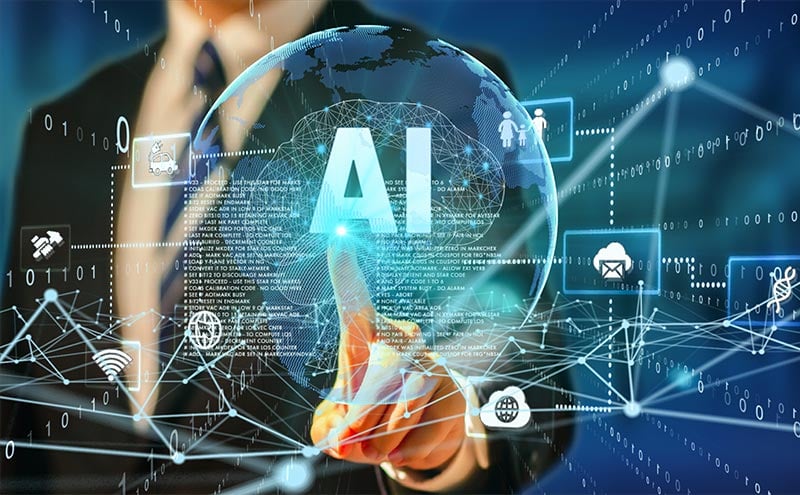Artificial Intelligence has evolved beyond the realm of imagination and has become an appealing subject. It has become an essential part of our lives and has been integrated into multiple facets of them.
AI has altered the way we inhabit the world by changing businesses, healthcare and education. As we approach the beginning of a new era, AI has the infinite potential to advance human abilities and raise the minimum standard of living.
AI can entirely change an array of industries including medical care, production and interaction with customers, enhancing both workforce and customer satisfaction.
In the healthcare sector, AI has been used to develop alternative treatments and medicines that possess an opportunity to significantly enhance the well-being of millions of individuals worldwide.
According to IBM, “As health and fitness monitors become more popular and more people use apps that track and analyze details about their health. They can share these real-time data sets with their doctors to monitor health issues and provide alerts in case of problems.”
Artificial intelligence methods also have a significant impact on the financial industry by identifying illicit activity and forecasting market changes.
As Netguru explains, “By identifying unusual patterns and streamlining data analysis, AI systems enable organizations to proactively mitigate potential losses and make informed decisions, allowing risk managers to focus on strategic decision-making and proactive risk mitigation.”
Students on campus have made note of the divide that AI is already causing in the business world.
“AI is expected to have significant consequences in a short time frame, like within the next two years,” said Tyla Graen, freshman engineering drafting and design major. “There will probably be a division: some businesses are going to continue to use human-led techniques, while others will place a greater value on artificial intelligence, generating outcomes of different standards. As [AI] establishes change and evolves, this disparity might have an enormous impact on job prospects.”
AI is growing more essential to the business world. Organizations utilize AI to enhance customer interactions, simplify procedures and promote development.
Businesses can use AI-powered analytical tools to make choices based on data while discovering more about the behavior of their clients. To accurately target people and personalize information, AI also has been utilized in marketing.
AI improves inventory management, demand forecasting and logistics management, leading to greater efficiency and reduced expenses.
According to Grydd, “The integration of AI and machine learning in logistics is revolutionizing supply chain management. From enhanced demand forecasting and optimized route planning to predictive maintenance and improved inventory management, these technologies are driving significant improvements in efficiency, cost savings, and customer satisfaction.”
AI and machine learning have many obstacles to overcome despite their potential, such as new regulations, privacy issues with data and employment displacement. In order to guarantee the moral and advantageous application of AI technologies, these concerns need to be resolved.
AI has also transformed our daily activities and employment responsibilities. Email categorization, task prioritization and data analysis are made easier by AI-powered solutions.
With AI, we can quickly gather and assess data, similar to having a personal assistant for research. AI can manage our calendars, arrange meetings, track finances and handle collaborative tasks.
Artificial Intelligence has quickly developed into a vital tool that improves student learning in a number of ways. AI’s capacity to offer prompt assistance is one of its main advantages.
Platforms with AI capabilities, such as Grammarly, Brainly and Duolingo, provide lessons, explanations and resources to aid students in comprehending particular ideas. This prompt assistance is essential for students who require additional support outside of regular school hours.
AI can also assist with language acquisition and translation of texts, which makes it simpler for students learning a new language or those from other countries to interact with the course materials. By assisting students in gathering and evaluating data for projects, AI also supports research.
AI systems can plan calendars, arrange study sessions and create task reminders to make sure students finish their academic obligations.
“AI offers great potential, it also brings significant responsibility. By addressing ethical challenges and ensuring the proper use of AI, we can lay the foundation for a future where technology and humanity coexist peacefully, promoting development and improving our standard of living for future generations,” said Shreeti Ghimire, sophomore nursing major.
Ghimire also noted that with modern translation services, AI will improve collaboration even more and individualized learning experiences will completely transform learning. This highlights the dual nature of AI’s impact and the need for careful consideration of its application.
We may provide the foundation for an era when technology and people coexist peacefully, advancing advancement and raising the standard of living for coming generations, if we embrace AI’s potential while being mindful of its effects. AI promises a better future, but to realize its full potential, we must carefully handle its hurdles.
Edited by Stuti Khadka and Jeremy Ford












